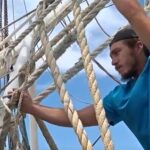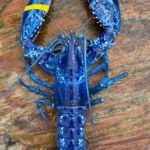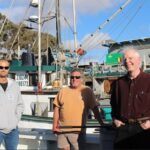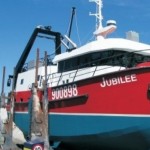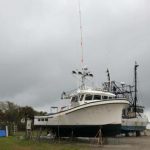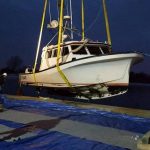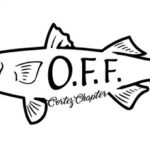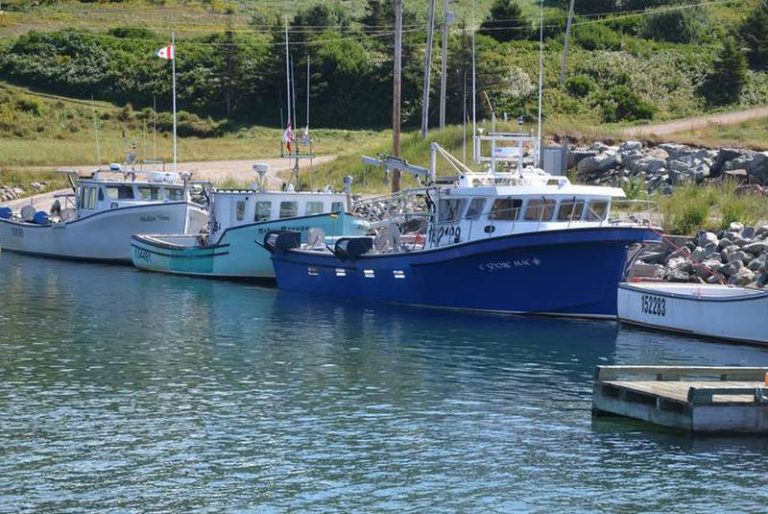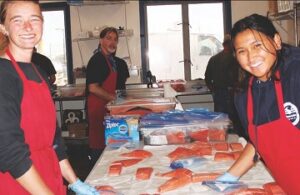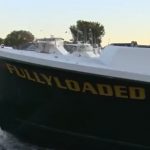Daily Archives: November 16, 2016
China-Bahamas fishing talks alarm Florida Officials
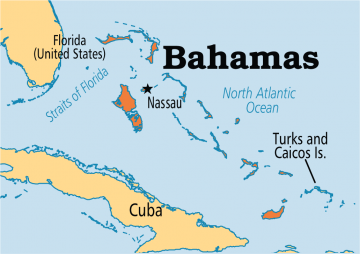 Florida wildlife officials expressed concern Wednesday that the government of the Bahamas is in talks with China to split fishing rights in waters east of Florida. State Fish and Wildlife Conservation Commission Executive Director Nick Wiley said the potential deal, as reported, could impact Florida’s commercial and sport-fishing industries. Under the reported terms of the deal, the government would lease to 100 companies — each jointly owned by Chinese and Bahamians shareholders — 10,000 acres in Andros Island, along with fishing licenses. “It is anticipated that the agricultural products and the seafood will be used either for local consumption or will be exported to China or the U.S.A. for sale,” the proposal says. Commercial fishing for conch, lobster, snapper and grouper are mainstays of the Andros Island’s economy. However, the indication is that the Chinese firms want to target dolphin, kingfish, marlin, tuna and wahoo. Read the story here 19:27
Florida wildlife officials expressed concern Wednesday that the government of the Bahamas is in talks with China to split fishing rights in waters east of Florida. State Fish and Wildlife Conservation Commission Executive Director Nick Wiley said the potential deal, as reported, could impact Florida’s commercial and sport-fishing industries. Under the reported terms of the deal, the government would lease to 100 companies — each jointly owned by Chinese and Bahamians shareholders — 10,000 acres in Andros Island, along with fishing licenses. “It is anticipated that the agricultural products and the seafood will be used either for local consumption or will be exported to China or the U.S.A. for sale,” the proposal says. Commercial fishing for conch, lobster, snapper and grouper are mainstays of the Andros Island’s economy. However, the indication is that the Chinese firms want to target dolphin, kingfish, marlin, tuna and wahoo. Read the story here 19:27
Scallop fishermen will be able to catch more next year
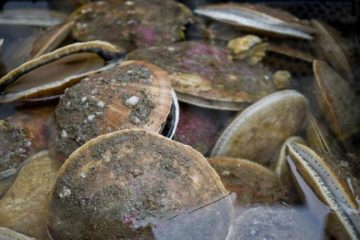 The New England Fishery Management Council approved rules on Wednesday that are expected to yield about 47 million pounds of scallops during the fishing year that begins in spring 2017. The decision is expected to allow fishermen to continue catching more scallops than they did just a few years ago. “We’re happy. It’s a valuable fishery right now,” said Jimmy Wotton, a Maine scallop fisherman. “People are starting to recognize it’s a top quality product, and they are willing to pay for it.” Fishermen are expected to land the extra scallops in an era when price to consumers is increasing and scallops are growing in popularity. Regulators are also allowing fishermen slightly more access to limited scallop fishing areas next year. Read the story here 17:44
The New England Fishery Management Council approved rules on Wednesday that are expected to yield about 47 million pounds of scallops during the fishing year that begins in spring 2017. The decision is expected to allow fishermen to continue catching more scallops than they did just a few years ago. “We’re happy. It’s a valuable fishery right now,” said Jimmy Wotton, a Maine scallop fisherman. “People are starting to recognize it’s a top quality product, and they are willing to pay for it.” Fishermen are expected to land the extra scallops in an era when price to consumers is increasing and scallops are growing in popularity. Regulators are also allowing fishermen slightly more access to limited scallop fishing areas next year. Read the story here 17:44
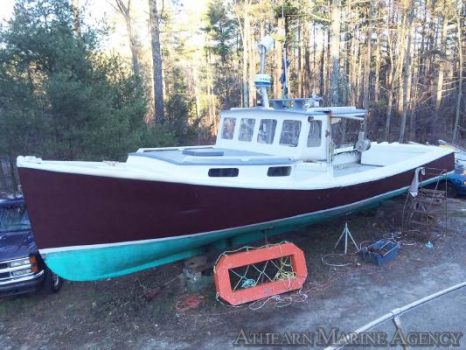
Athearn Marine Agency Boat of the Week: 34.8′ Wood/Fiberglass Lobster boat, 8 Cylinder Detroit 8.2 Diesel, Permits and Gear
Specifications, information and 7 photo’s click here To see all the boats in this series, Click here 12:11
Can North Carolina’s Local Seafood Movement Help Save its Fishermen?
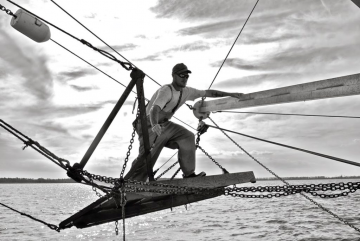 North Carolina’s commercial fishermen—who work primarily in independent, small-scale operations—landed 66 million pounds of fish last year, but rather than ending up on North Carolina plates, the majority was whisked out of state to markets where it could fetch a higher price. “I think more New Yorkers eat North Carolina seafood than North Carolinians,” says Ann Simpson, who grew up in a small town on the coast and currently directs North Carolina Catch, a partnership of smaller organizations working to strengthen the state’s local seafood economy. To fill the void created by the export of its catch, North Carolina—like most states—ships in seafood from abroad. Today, around 90 percent of the seafood Americans eat has been imported from places like China, Thailand, Canada, Indonesia, Vietnam, and Ecuador, and the average fish travels more than 5,400 miles between the landing dock and point of sale. “We don’t do one thing year-round,” says longtime fisherman Dewey Hemilright, who operates a 42-foot boat named Tar Baby out of Wanchese, North Carolina, catching tuna, swordfish, bluefish, spiny dogfish, croakers, blueline tilefish, and many others, depending on the season. “The diversity of fisheries is what makes us unique.” Read the story here 11:26
North Carolina’s commercial fishermen—who work primarily in independent, small-scale operations—landed 66 million pounds of fish last year, but rather than ending up on North Carolina plates, the majority was whisked out of state to markets where it could fetch a higher price. “I think more New Yorkers eat North Carolina seafood than North Carolinians,” says Ann Simpson, who grew up in a small town on the coast and currently directs North Carolina Catch, a partnership of smaller organizations working to strengthen the state’s local seafood economy. To fill the void created by the export of its catch, North Carolina—like most states—ships in seafood from abroad. Today, around 90 percent of the seafood Americans eat has been imported from places like China, Thailand, Canada, Indonesia, Vietnam, and Ecuador, and the average fish travels more than 5,400 miles between the landing dock and point of sale. “We don’t do one thing year-round,” says longtime fisherman Dewey Hemilright, who operates a 42-foot boat named Tar Baby out of Wanchese, North Carolina, catching tuna, swordfish, bluefish, spiny dogfish, croakers, blueline tilefish, and many others, depending on the season. “The diversity of fisheries is what makes us unique.” Read the story here 11:26
Warning sent to illegal foreign lobster licence buyers
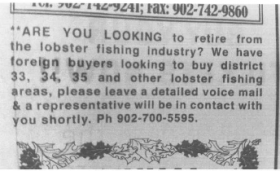 A Canadian fishers’ federation is firing a warning shot across the bow of foreign buyers for allegedly trying to illegally buy inshore lobster fishing licences. After an advertisement appeared in two newspapers in southern Nova Scotia, the Canadian Independent Fish Harvesters’ Federation became alarmed foreign investors could be scooping up these licences. A classified ad in the Lobster Bay and Clare Shoppers, newspapers published by Marc Graff, asked lobster fishing boat operators if they were looking to retire. The ad then makes a claim. “We have foreign buyers looking to buy district 33,34, 35 and other lobster fishing areas,” the ad reads. Those are the areas for the inshore lobster fishery in southern Nova Scotia. The ad also lists a telephone number for interested parties. But there was no reply to a voice mail message left on it Tuesday. And while the newspaper publisher did identify the advertiser behind that classified ad Tuesday as Novi Marine Brokers in Yarmouth, the director of operations at that company denied any knowledge of it. “I know nothing about that ad,” Tammy Ward, Novi Marine Brokers’ director of operations, said Tuesday. Read the story here 11:01
A Canadian fishers’ federation is firing a warning shot across the bow of foreign buyers for allegedly trying to illegally buy inshore lobster fishing licences. After an advertisement appeared in two newspapers in southern Nova Scotia, the Canadian Independent Fish Harvesters’ Federation became alarmed foreign investors could be scooping up these licences. A classified ad in the Lobster Bay and Clare Shoppers, newspapers published by Marc Graff, asked lobster fishing boat operators if they were looking to retire. The ad then makes a claim. “We have foreign buyers looking to buy district 33,34, 35 and other lobster fishing areas,” the ad reads. Those are the areas for the inshore lobster fishery in southern Nova Scotia. The ad also lists a telephone number for interested parties. But there was no reply to a voice mail message left on it Tuesday. And while the newspaper publisher did identify the advertiser behind that classified ad Tuesday as Novi Marine Brokers in Yarmouth, the director of operations at that company denied any knowledge of it. “I know nothing about that ad,” Tammy Ward, Novi Marine Brokers’ director of operations, said Tuesday. Read the story here 11:01
2 arrested in assault of ‘Deadliest Catch’ star Jake Harris
 Authorities in Washington state said Tuesday that two people accused of beating one of the stars of the TV series “Deadliest Catch” over the weekend were arrested. The Spokesman-Review reported that Amanda Ritter, 30, and Jorel Fultz, 29, were arrested and booked into the Spokane County Jail on suspicion of robbing Jake Harris. Everett police said they received a report of a male victim of assault Saturday after Harris had been found on the side of the road in Everett. Police spokesperson Aaron Snell said personal items were taken from Harris. The TV personality reportedly told police that he and three others were in a car coming back from a casino when a man sitting behind him began to attack him. Read the story here 10:36
Authorities in Washington state said Tuesday that two people accused of beating one of the stars of the TV series “Deadliest Catch” over the weekend were arrested. The Spokesman-Review reported that Amanda Ritter, 30, and Jorel Fultz, 29, were arrested and booked into the Spokane County Jail on suspicion of robbing Jake Harris. Everett police said they received a report of a male victim of assault Saturday after Harris had been found on the side of the road in Everett. Police spokesperson Aaron Snell said personal items were taken from Harris. The TV personality reportedly told police that he and three others were in a car coming back from a casino when a man sitting behind him began to attack him. Read the story here 10:36
Commercial crab season opens with regs to protect whales
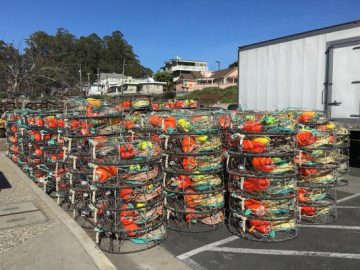 As commercial fishermen set their traps in preparation for the Dungeness crab season, both fishermen and environmentalists hope that new regulations will protect whales from being snared. To protect the whales, the CDCWE working group met last month and created a “Best Practices” guide for crab fishermen. The guide suggests specific distances between the main and leader buoys and recommends that fishermen keep their gear well maintained so it won’t break apart and float away. This group is composed of commercial and recreational crab fishermen, environmentalists, members from the whale disentanglement network, and state and federal agency employees. “The crab fishermen have been very active in participating in the dialogue on ways to reduce whale entanglements,” said Moss Landing Harbor Master Linda McIntyre. “They are as anxious and committed to deterring these occurrences as anyone.” Read the story here 10:18
As commercial fishermen set their traps in preparation for the Dungeness crab season, both fishermen and environmentalists hope that new regulations will protect whales from being snared. To protect the whales, the CDCWE working group met last month and created a “Best Practices” guide for crab fishermen. The guide suggests specific distances between the main and leader buoys and recommends that fishermen keep their gear well maintained so it won’t break apart and float away. This group is composed of commercial and recreational crab fishermen, environmentalists, members from the whale disentanglement network, and state and federal agency employees. “The crab fishermen have been very active in participating in the dialogue on ways to reduce whale entanglements,” said Moss Landing Harbor Master Linda McIntyre. “They are as anxious and committed to deterring these occurrences as anyone.” Read the story here 10:18
Trump victory brings hope for shrimpers
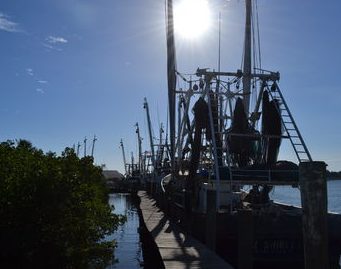 Roger Schmall’s shrimp boat engine lay in pieces on his deck. After the last one, which cost $35,000 came apart after only one trip out to sea, he’s decided to rebuild one himself to make sure it’s done right. Engines usually last 8 to 10 years, but he got a bad one, he said. He’s just got one boat these days, the Kayden Nicole, so his livelihood is tied to a working engine. Schmall’s spent the last 34 years working in the industry, and one of the few left of his ilk. Schmall is one of many local shrimpers who were hit hard when the U.S. began opening up to international trade through deals like the North American Trade Act (NAFTA), passed in 1994. During his campaign and in his 100 day plan which he outlined in his speech at Gettysburg in October, President Elect Donald Trump pledged to withdraw, or at least substantially change, some of the U.S.’s deals with other countries. Read the story here 10:03
Roger Schmall’s shrimp boat engine lay in pieces on his deck. After the last one, which cost $35,000 came apart after only one trip out to sea, he’s decided to rebuild one himself to make sure it’s done right. Engines usually last 8 to 10 years, but he got a bad one, he said. He’s just got one boat these days, the Kayden Nicole, so his livelihood is tied to a working engine. Schmall’s spent the last 34 years working in the industry, and one of the few left of his ilk. Schmall is one of many local shrimpers who were hit hard when the U.S. began opening up to international trade through deals like the North American Trade Act (NAFTA), passed in 1994. During his campaign and in his 100 day plan which he outlined in his speech at Gettysburg in October, President Elect Donald Trump pledged to withdraw, or at least substantially change, some of the U.S.’s deals with other countries. Read the story here 10:03
Too broke for boats, Cubans inflate condoms to find big fish
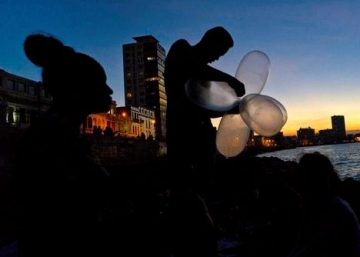 Juan Luis Rosello sat for three hours on the Malecon as the wind blew in from the Florida Straits, pushing the waves hard against the seawall of Havana’s coastal boulevard. As darkness settled and the wind switched direction, Rosello pulled four condoms from a satchel and began to blow them up. When the contraceptives were the size of balloons, the 47-year-old cafeteria worker tied them together by their ends, attached them to the end of a baited fishing line and set them floating on the tide until they reached the end of his 750-foot line. After six decades under U.S. embargo and Soviet-inspired central planning, Cubans have become masters at finding ingenious solutions with extremely limited resources. Few are as creative as what Havana’s fishermen call “balloon fishing,” a technique employing a couple of cents worth of condoms to pull fish worth an average month’s salary from the ocean. Read the story here 09:21
Juan Luis Rosello sat for three hours on the Malecon as the wind blew in from the Florida Straits, pushing the waves hard against the seawall of Havana’s coastal boulevard. As darkness settled and the wind switched direction, Rosello pulled four condoms from a satchel and began to blow them up. When the contraceptives were the size of balloons, the 47-year-old cafeteria worker tied them together by their ends, attached them to the end of a baited fishing line and set them floating on the tide until they reached the end of his 750-foot line. After six decades under U.S. embargo and Soviet-inspired central planning, Cubans have become masters at finding ingenious solutions with extremely limited resources. Few are as creative as what Havana’s fishermen call “balloon fishing,” a technique employing a couple of cents worth of condoms to pull fish worth an average month’s salary from the ocean. Read the story here 09:21
Herring trawlers just offshore anger Cape fishermen
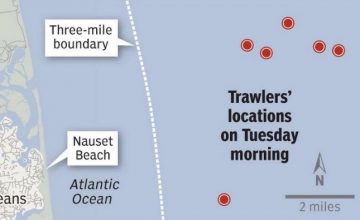 They were visible from shore for most of Tuesday, seven vessels of between 140 to 170 feet in length, four miles off Nauset Beach. Some worked in tandem, towing a huge net between them, scooping up mackerel or herring right on the Cape’s doorstep and making local fishermen like Bruce Peters angry. “They suck up all the herring and mackerel, the forage fish we need for the cod, tuna, stripers, the whales, what we need for the food chain,” said Peters, a longtime commercial cod and groundfish fisherman, who now runs a charter boat business and fishes commercially for tuna. “We need a 50-mile buffer zone to keep these guys offshore.” Read the story here 08:59
They were visible from shore for most of Tuesday, seven vessels of between 140 to 170 feet in length, four miles off Nauset Beach. Some worked in tandem, towing a huge net between them, scooping up mackerel or herring right on the Cape’s doorstep and making local fishermen like Bruce Peters angry. “They suck up all the herring and mackerel, the forage fish we need for the cod, tuna, stripers, the whales, what we need for the food chain,” said Peters, a longtime commercial cod and groundfish fisherman, who now runs a charter boat business and fishes commercially for tuna. “We need a 50-mile buffer zone to keep these guys offshore.” Read the story here 08:59
‘Cut-throat industry’: Crabber stole 19 pots for revenge
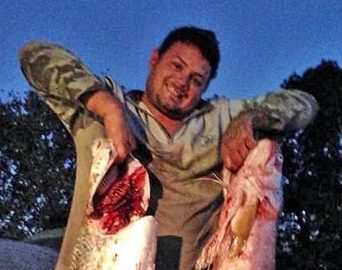 A Gladstone crabber told the court “there are no honest fishermen”, and he had to steal other people’s crab pots to compensate for his own stolen gear. Commercial fisherman Suny Platen pleaded guilty in Gladstone Magistrates Court to five charges of unlawfully interfering with fishing apparatus, after being caught red-handed on April 14. Queensland Boating and Fisheries Patrol officer Neil Conway said QBFP officers had stopped a boat at Gladstone Marina about 1.30am, and found Platen and two other men with 19 crab pots containing 14 live crabs. The pots and their floats were marked with commercial fishing symbols not belonging to Platen. Platen said crabbing was a “cut-throat industry,” and he acted after 22 of his own pots were stolen over two nights. “I’ve had my pots go missing, my car smashed … it’s a savage game,” he said. Read the story here 08:01
A Gladstone crabber told the court “there are no honest fishermen”, and he had to steal other people’s crab pots to compensate for his own stolen gear. Commercial fisherman Suny Platen pleaded guilty in Gladstone Magistrates Court to five charges of unlawfully interfering with fishing apparatus, after being caught red-handed on April 14. Queensland Boating and Fisheries Patrol officer Neil Conway said QBFP officers had stopped a boat at Gladstone Marina about 1.30am, and found Platen and two other men with 19 crab pots containing 14 live crabs. The pots and their floats were marked with commercial fishing symbols not belonging to Platen. Platen said crabbing was a “cut-throat industry,” and he acted after 22 of his own pots were stolen over two nights. “I’ve had my pots go missing, my car smashed … it’s a savage game,” he said. Read the story here 08:01


































